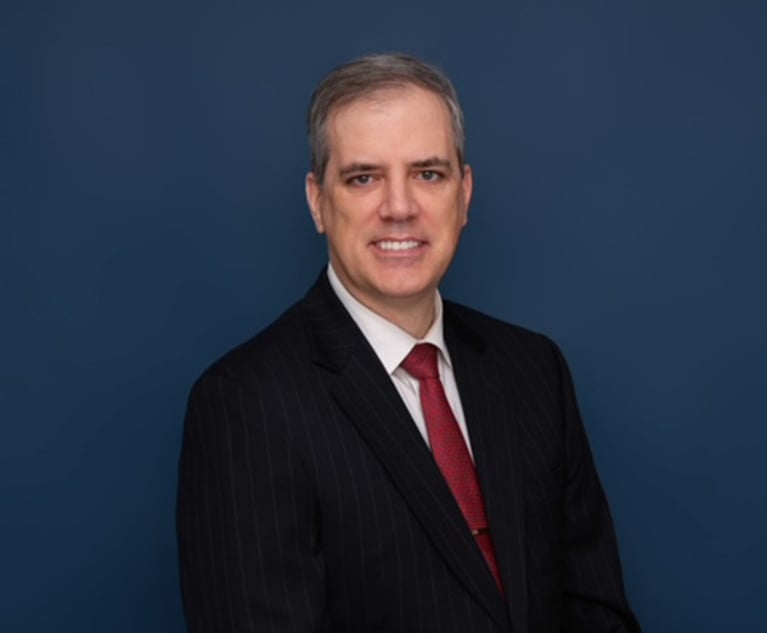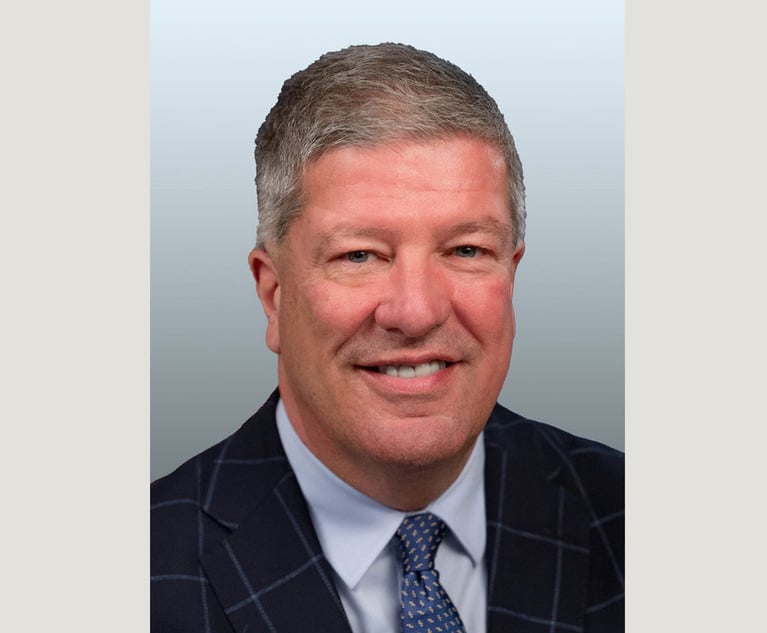Who Must Profit From Ethics Breach to Allow for Restitution Order?
The commission found that although Sivick officially abstained from the township Board of Supervisors vote to repeal the nepotism policy, he had worked behind the scenes to advocate for the repeal so that his son could be eligible for a job.
August 15, 2019 at 01:58 PM
6 minute read
 Photo: welcomia/Shutterstock.com
Photo: welcomia/Shutterstock.com
The Pennsylvania Supreme Court has agreed to consider whether a public official who was found to have violated the Public Official and Employee Ethics Act can be ordered to pay restitution despite the fact that the financial benefit of his actions went to his son, not to him.
The State Ethics Commission found John Sivick had violated the act when, as supervisor and public works director of Lehman Township in Pike County, he pushed for the township to repeal its nepotism policy and hire his son as a road crew worker; participated in verifying payroll records for township employees, including his son; and filed incomplete statements of financial interests in 2011 and 2014.
The commission found that although Sivick officially abstained from the township Board of Supervisors vote to repeal the nepotism policy, he had worked behind the scenes to advocate for the repeal so that his son could be eligible for a job. Once his son obtained a position on the road crew, Sivick reviewed and approved his time sheets along with the other employees on the road crew.
The commission ordered Sivick to pay $30,000 in restitution to the state and to amend the 2011 and 2014 SFIs. Sivick appealed to the Commonwealth Court, arguing that restitution may only be ordered where financial gain from violation of the act is reaped by a public official or public employee. The only person who could be said to have financially benefited, Sivick argued, is his son, who did not fall under the statutory definition of public official or public employee.
But a unanimous three-judge Commonwealth Court panel ruled in January that Sivick’s interpretation of the act was flawed.
Judge Anne Covey, writing for the panel, said that while Section 1107(13) of the act states that “any order resulting from a finding that a public official or public employee has obtained a financial gain in violation of this chapter may require the restitution plus interest of that gain to the appropriate governmental body,” that section must be read together with Section 1102, which defines “conflict of interest” as “use by a public official or public employee of the authority of his office or employment … for the private pecuniary benefit of himself, [or] a member of his immediate family.”
“Thus, the reference to ‘a finding that a public official or public employee has obtained a financial gain in violation of this chapter’ in Section 1107(13) of the Ethics Act … refers to a financial gain ‘benefit[ting the public official or public employee], [or] a member of his immediate family,’” Covey said. ”Any other interpretation would be illogical and result in an inconsistent application of the Ethics Act based solely upon who happened to benefit from the prohibited conduct.”
Covey said it was Sivick’s efforts to have the township repeal its nepotism policy and hire his son that resulted in his son receiving the pecuniary benefit in the form of a salary. Therefore, she said, restitution is proper.
Covey was joined by Judges Renee Cohn Jubelirer and Ellen Ceisler.
On Aug. 6, the Supreme Court granted allocatur in the case to hear argument on two issues, the first of which is “Whether, under Section 1107(13) of the Public Official and Employees Ethics Act … the State Ethics Commission, upon a finding that a public official or public employee violated the act, has the authority to order restitution when the individual who obtained financial gain is not the public official or employee, but is an immediate family member of the public official or employee?”
The second issue the high court has agreed to mull is “Whether the action of a public official or public employee reviewing and approving payroll records of a group of subordinate employees, one or more of whom is the public official’s or employee’s immediate family member, falls within the class/subclass exemption of the ‘conflict of interest’ definition in the Public Official and Employee Ethics Act, 65 Pa.C.S. Sections 1101-1113.”
Sivick had argued to the Commonwealth Court that reviewing payroll records of a group of employees that happened to include his son was not a violation of the act because the class/subclass exclusion to the definition of “conflict of interest” exempts any action “‘which affects to the same degree a class consisting of the general public or a subclass consisting of an industry, occupation or other group which includes the public official or public employee, a member of his immediate family or a business with which he or a member of his immediate family is associated.’”
But Covey agreed with the the commission’s finding that Sivick’s actions did not fall under that exclusion because he reviewed and approved each employee’s time sheet and payroll records separately.
“Sivick’s actions were not broad conduct generally affecting a class—his employees,” Covey said. “Instead, he reviewed each employee’s individual time sheet presumably to consider whether it accurately reflected that employee’s working hours. Thereafter, he issued approvals based on each such individual’s time sheet.”
Counsel for Sivick, Edmund Healy of Macungie, said the statute is clear that restitution is only proper where a public official or public employee receives a pecuniary benefit and his client’s son was neither a public official nor a public employee as defined under the act.
“It is unheard of, as far as I’m concerned, for the commission and the Commonwealth Court to expect restitution from Mr. Sivick when he received no pecuniary benefit under the statute,” Healy said.
But the commission’s executive director, Robert Caruso, said the statute calls for restitution where the pecuniary benefit went to a public official or public employee, or an immediate family member.
“The facts in this case clearly show Mr. Sivick manipulated township ordinances and was behind the scenes doing the lobbying—the coaxing, if you will—of the Board of Supervisors that led to his son being hired,” Caruso said.
This content has been archived. It is available through our partners, LexisNexis® and Bloomberg Law.
To view this content, please continue to their sites.
Not a Lexis Subscriber?
Subscribe Now
Not a Bloomberg Law Subscriber?
Subscribe Now
NOT FOR REPRINT
© 2025 ALM Global, LLC, All Rights Reserved. Request academic re-use from www.copyright.com. All other uses, submit a request to [email protected]. For more information visit Asset & Logo Licensing.
You Might Like
View All


Stevens & Lee Hires Ex-Middle District of Pennsylvania U.S. Attorney as White-Collar Co-Chair
3 minute read
Judge Tanks Prevailing Pittsburgh Attorneys' $2.45M Fee Request to $250K
5 minute readTrending Stories
- 1Being a Profession is Not Malarkey
- 2Bring NJ's 'Pretrial Opportunity Program' into the Open
- 3High-Speed Crash With Police Vehicle Nets $1.6 Million Settlement
- 4Embracing a ‘Stronger Together’ Mentality: Collaboration Best Practices for Attorneys
- 5Selling Law. How to Get Hired, Paid and Rehired
Who Got The Work
J. Brugh Lower of Gibbons has entered an appearance for industrial equipment supplier Devco Corporation in a pending trademark infringement lawsuit. The suit, accusing the defendant of selling knock-off Graco products, was filed Dec. 18 in New Jersey District Court by Rivkin Radler on behalf of Graco Inc. and Graco Minnesota. The case, assigned to U.S. District Judge Zahid N. Quraishi, is 3:24-cv-11294, Graco Inc. et al v. Devco Corporation.
Who Got The Work
Rebecca Maller-Stein and Kent A. Yalowitz of Arnold & Porter Kaye Scholer have entered their appearances for Hanaco Venture Capital and its executives, Lior Prosor and David Frankel, in a pending securities lawsuit. The action, filed on Dec. 24 in New York Southern District Court by Zell, Aron & Co. on behalf of Goldeneye Advisors, accuses the defendants of negligently and fraudulently managing the plaintiff's $1 million investment. The case, assigned to U.S. District Judge Vernon S. Broderick, is 1:24-cv-09918, Goldeneye Advisors, LLC v. Hanaco Venture Capital, Ltd. et al.
Who Got The Work
Attorneys from A&O Shearman has stepped in as defense counsel for Toronto-Dominion Bank and other defendants in a pending securities class action. The suit, filed Dec. 11 in New York Southern District Court by Bleichmar Fonti & Auld, accuses the defendants of concealing the bank's 'pervasive' deficiencies in regards to its compliance with the Bank Secrecy Act and the quality of its anti-money laundering controls. The case, assigned to U.S. District Judge Arun Subramanian, is 1:24-cv-09445, Gonzalez v. The Toronto-Dominion Bank et al.
Who Got The Work
Crown Castle International, a Pennsylvania company providing shared communications infrastructure, has turned to Luke D. Wolf of Gordon Rees Scully Mansukhani to fend off a pending breach-of-contract lawsuit. The court action, filed Nov. 25 in Michigan Eastern District Court by Hooper Hathaway PC on behalf of The Town Residences LLC, accuses Crown Castle of failing to transfer approximately $30,000 in utility payments from T-Mobile in breach of a roof-top lease and assignment agreement. The case, assigned to U.S. District Judge Susan K. Declercq, is 2:24-cv-13131, The Town Residences LLC v. T-Mobile US, Inc. et al.
Who Got The Work
Wilfred P. Coronato and Daniel M. Schwartz of McCarter & English have stepped in as defense counsel to Electrolux Home Products Inc. in a pending product liability lawsuit. The court action, filed Nov. 26 in New York Eastern District Court by Poulos Lopiccolo PC and Nagel Rice LLP on behalf of David Stern, alleges that the defendant's refrigerators’ drawers and shelving repeatedly break and fall apart within months after purchase. The case, assigned to U.S. District Judge Joan M. Azrack, is 2:24-cv-08204, Stern v. Electrolux Home Products, Inc.
Featured Firms
Law Offices of Gary Martin Hays & Associates, P.C.
(470) 294-1674
Law Offices of Mark E. Salomone
(857) 444-6468
Smith & Hassler
(713) 739-1250





